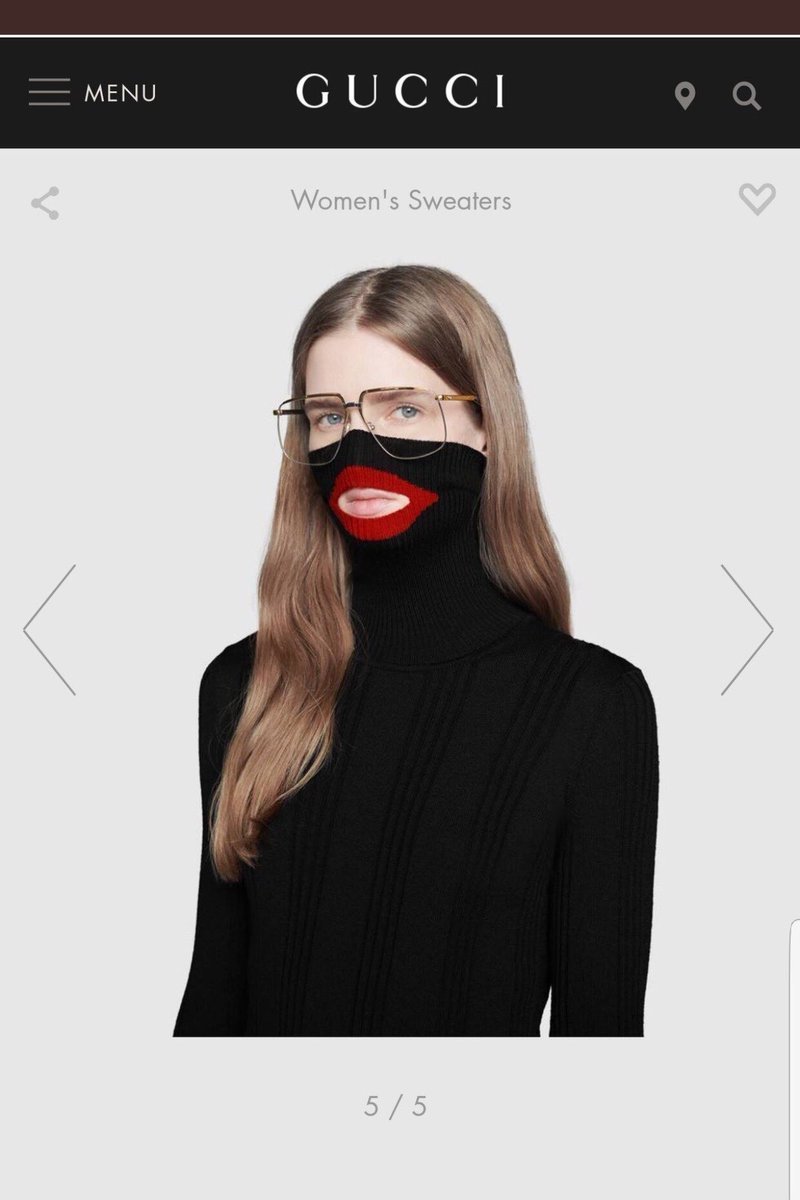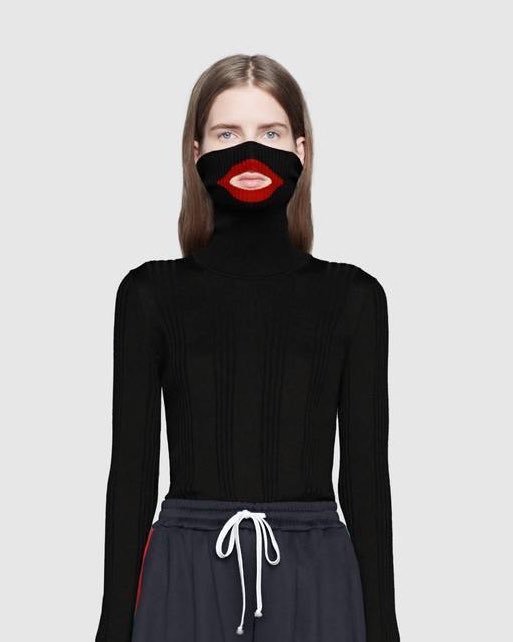Brands lately seem to think racism is cute. Just so you know, it's not. Especially not during Black History Month. That didn't stop Gucci from releasing a jumper that appeared to give its wearer blackface.
Twitter went in on the brand until it recalled the item and released an apology, but this is merely one more in a long list of racist items invented by fashion designers. Adidas recently did the same thing with the collection it released for Black History Month, and Prada experience similar backlash last year. Seriously, who is approving this nonsense?
Just in case you were wondering what not to get your S.O. for Valentine's Day, here's an idea: A Gucci sweater that looks an awful lot like blackface.

Gucci recently unveiled these jumpers featuring a built-in balaclava. According to The New York Times, this sweater was retailing for a casual $890.
Just in case you're unaware, a balaclava is a kind of headgear that covers your nose and mouth (think ski mask or the Black Hood from Riverdale). Considering how cold it is this time of year in America, this design could've made sense, were it not for one disturbing detail.
The problem isn't the balaclava itself — it's that the black jumper's red detailing strongly resembles the lips seen on offensive blackface characters throughout history.

This jumper could have been a cute yet functional piece in someone's wardrobe, but the "lips" take it to another level entirely.
Gucci caught wind for a similar face mask that matches these new sweaters almost exactly.
Masks without the sweater were also available. They featured the same big red lips around the mouth opening.
Twitter was rightfully upset.
Michelle Singletary is an author and personal finance columnist for The Washington Post. She was quick to see the comparisons between this sweater and racist images of black people.
"We have ONE month to celebrate the history of African Americans. Feb. 2019: Multiple accounts of politicians wearing blackface. And now news Gucci was selling a $890 blackface sweater. We are a nation desperately in need of diversity training," she wrote.
These images of black people have been around for far too long.
Some people might think a sweater is no big deal, but blackface has a long history, and it looks just like this sweater. Blackface performers used this over-exaggerated fallacy of blackness (dark skin, comedially large, red lips) during shows to humiliate black people with hurtful stereotypes.
These shows typically portrayed black people as being uneducated, among a whole slew of other negative traits. This clip from one performance goes as far as to say black people are worthless.
Blackface even pops up in children's cartoons from time to time — no wonder this racism is so pervasive.
Shows aimed at children aren't strangers to blackface either. These showed black people as lazy. In this clip, you can see a black man picking cotton.
Gucci promptly released an apology and pulled the items from its website.
Gucci released a statement saying it "deeply apologizes" for the items and that they would be taking it offline.
"Gucci deeply apologizes for the offense caused by the wool balaclava jumper. We can confirm that the item has been immediately removed from our online store and all physical stores.
We consider diversity to be a fundamental value to be fully upheld, respected, and at the forefront of every decision we make. We are fully committed to increasing diversity throughout our organization and turning this incident into a powerful learning moment for the Gucci team and beyond."
And Twitter basically said, "that sounds fake, but OK."
People immediately commented on Gucci's "apology." If the brand really wanted to avoid these missteps, it would hire a more racially diverse staff. Period.
This tweet says, "If you hire more Black people and cultivate an environment where people on all levels of the company feel comfortable to speak up incidents like this will be avoided."
Another tweet said that this is exactly what Gucci wanted. Some people still believe that there's no such thing as bad publicity.
Didn't you hear? Black rage is today's hottest marketing ploy. Get enough black people to talk about your product, and news will spread quickly. This person thinks that's exactly what Gucci did when it made this mess — they knew how people would react.
"Gucci made this item slightly offensive (just racist enough to cause outrage, but not racist enough to be indefensible) on purpose, so that Gucci could get black twitter talking about their item. Then Gucci came with the textbook apology after they got the attention they wanted," this Twitter user shared.
At the end of the day, no one says you have to even buy Gucci products. No one would blame you for cancelling the brand altogether.
Gucci can hire all the black people it wants, but none of that will matter if its doesn't value their (or your) opinions. You can be active in your shopping process and buy things that truly represent you. Don't just shop somewhere for a name.
Gucci isn't the only brand with a racism problem. Prada had a similar stint late last year.
Prada had to issue an apology last year when its ads bared a strong resemblance to blackface as well. Monkeys figurines in what looked like blackface (literally how racist can one ad get) were spotted in a Prada display, and the Internet dragged them for filth.
Prada also offered a generic apology alarmingly similar to Gucci's.
Prada didn't really apologize, if you ask me. It just asked its PR team for a response, and this is what it got.
"We are committed to creating products that celebrate the diverse fashion and beauty of cultures around the world. We’ve removed all Pradamalia products that were offensive from the market and are taking immediate steps to learn from this."
Adidas also got dragged for releasing an all-white shoe in honor of Black History Month.
The brand pulled this all-white shoe from its Black History Month collection. Each shoe in the collection was supposed to be inspired by the Harlem Renaissance, although I'm not sure how it was inspired by anything if it's just all one color.
Adidas released a statement, too, and now I'm seeing a pattern with these brands.
The Adidas statement read as follows_: "Adidas released a new collection in celebration of Black History Month featuring designs inspired by the Harlem Renaissance. It includes footwear and apparel across a variety of categories. Toward the latter stages of the design process, we added a running shoe to the collection that we later felt did not reflect the spirit or philosophy of how adidas believes we should recognize and honor Black History Month. After careful consideration, we have decided to withdraw the product from the collection."_
Do all these brands have the same PR team? Adidas removed the shoe from its collection, but you can still buy it. And really, how long will it take until I'm writing this same story about another designer?
Hey, you — want more stuff just like this? Follow Revelist on Facebook, Instagram, YouTube, and Twitter!




